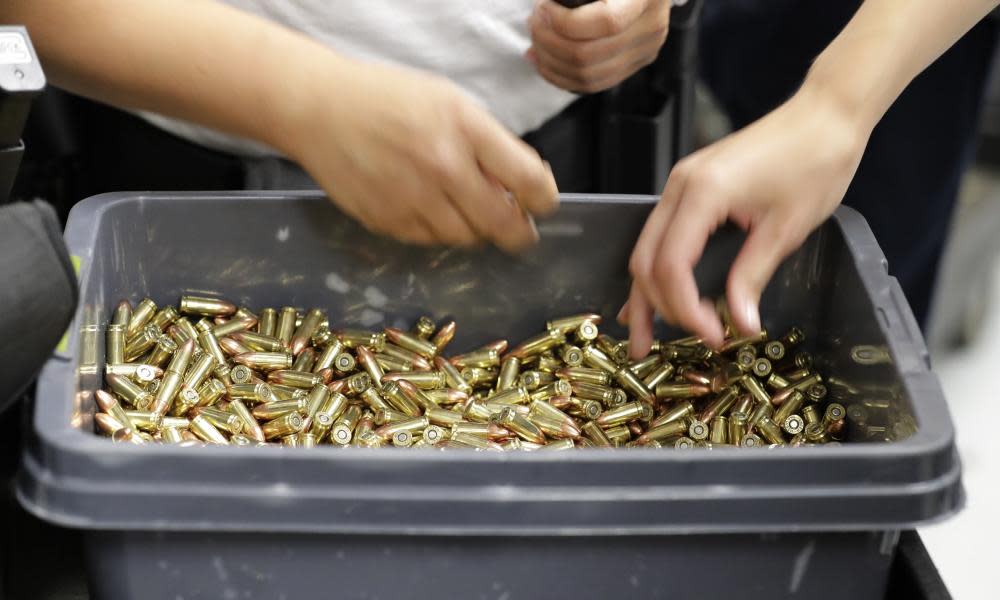‘Grandmas buying shotguns’: US dealers see ammunition shortage as sales surge

The coronavirus pandemic in the US has been accompanied by soaring gun sales attributed to fears around social unrest and crime and, in some cases, people having more time for hunting.
Related: ‘We have to break through that wall’: inside America’s battle for gun control
But now ammunition has fallen into short supply.
Manufacturers say they are producing as much as they can but in many gun stores shelves are sparse and prices are concurrently rising.
“We have had a number of firearms instructors cancel their registration to our courses because their agency was short on ammo or they were unable to find ammo to purchase,” Jason Wuestenberg, executive director of the National Law Enforcement Firearms Instructors Association, told the Associated Press.
In April last year, at A&J Arms in Bardonia, New York, firearms dealer Arden Frazin told the Guardian his stock of military-style AR-15 rifles had sold out, with two-dozen on back order.
On Saturday, he said: “You need to remember that 8m or 9m guns were sold to first-time buyers during the pandemic. So that’s two boxes of ammo each, or 800m new bullets, and that has nothing to do with people who already had guns.”
The ammunition most in demand, Frazin said, includes 12-gauge shotgun shells, 9mm bullets suitable for a handgun and .556 bullets suitable for military-style rifles.
“We have 10 or 15 distributors and the factories are running 24-7 but we still cant keep up with demand,” he said. “They can charge whatever they like and we can’t get shit.”
Ari Freilich, of the Giffords Law Center to Prevent Gun Violence, told AP: “Early on in the pandemic, we saw people hoarding toilet paper, disinfectant. Now it’s ammo.”
According to the National Shooting Sports Foundation, more than 50m people participate in shooting sports in the US. The NSSF estimates 20m guns were sold in 2020.
The FBI National Instant Criminal Background Check System database also documented an increase in sales. In 2010, there were 14.4m background checks for gun purchases. That jumped to almost 39.7m in 2020 and 22.2m through June 2021.
Frazin said he thought part of the demand for ammunition centered on fears that the Biden administration could raise federal taxes on gun purchases, a concern promulgated by gun advocacy groups during the Obama administration that led to a similar run on guns and ammunition.
To make up for domestic-production shortages, imports of ammunition from Russia, South Korea, the European Union and other sources were up 225% over the past two years, according to an analysis by Panjiva, which tracks global trade.
In Nanuet, New York on Saturday, a similar story of demand and shortage was told at Good Guys Guns & Ammo. Manager Joe O’Healy said ammunition sales had increased tenfold and deliveries of 10,000 rounds were selling out within three days.
“It’s this mass pandemic fear around arming the nation,” he said. “We see things we’ve never seen before, like single moms with strollers and grandmas buying shotguns.”
O’Healy said new buyers were not necessarily conservatives.
“We’ve had people in here with Biden-Harris masks saying they want something small for their purse. We have to say, ‘Sorry, lady, it takes eight to 18 months to get a handgun permit.”
Such customers get mad, O’Healy said. “Everybody is excited to control stuff until it controls you. We say, ‘Well, you voted for stricter gun controls. So get in line and join everybody else.’”
Related: Utah company halts sales of Lego handgun case kits after cease and desist
Ammunition shortages have reportedly affected law enforcement but not the US military. However, the US Army 2022 budget calls for cuts to ammunition purchasing. Overall such spending next year could be $2.1bn, down from $2.8bn.
Consumer shortages comes as some big retailers have moved to reduce sales amid political pressure. In 2019, a month after 22 people were killed in a mass shooting at a store in El Paso, Texas, Walmart said it would halve its market share by discontinuing sales of ammunition for handguns and military-style weapons.
That proved a boon for sellers like O’Healy.
“In the first six to nine months of the pandemic we sold out of firearms and ammunition every time we got them,” he said. “We couldn’t order enough. Now, everybody who wanted a gun got one and it’s starting to calm down.”
“It’s been great for business,” he said.

